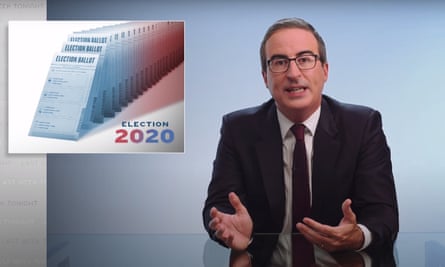Extract from The Guardian
John Oliver recap Late-night TV roundup
The Last Week Tonight host on a virus outbreak at the White House and threats to an already perilous election.

Last modified on Tue 6 Oct 2020 03.15 AEDT
The week in news was so jam-packed, said John Oliver on Last Week Tonight, that even taping on a Saturday, there was barely time to talk about the New York Times’s bombshell investigation into Trump’s taxes, a recording of Melania ranting about Christmas decorations, or even Tuesday’s train wreck of a presidential debate. The headline story was, of course, Trump’s contraction of coronavirus, news that “felt both shocking and utterly inevitable”, Oliver said, as the White House handled the outbreak “terribly” with misleading timelines and confusing, obfuscatory updates on the president’s health.
“So many of the decisions that Trump and those around him made this week look absolutely appalling in hindsight,” Oliver said, “from his family refusing to wear masks at Tuesday’s debate, to failure to notify anyone on the Biden team that they may have been exposed, to the fact that the fundraiser he attended just before testing positive was a fucking buffet.”
But the worst look, Oliver continued, was that the locus point of transmission for many Republican officials – three GOP senators, Trump aide Hope Hicks, adviser Kellyanne Conway and New Jersey governor Chris Christie all tested positive last week – appears to be a party held last Saturday at the White House to celebrate Trump’s nomination of Amy Coney Barrett for the supreme court. “Much like the slew of utterly horrifying supreme court rulings over the next few decades, it seems we may look back on last Saturday’s event and say all of this began there,” Oliver said.
It was “utterly infuriating”, Oliver added, to see pictures of mask-less Republicans hugging each other on the White House lawn “when many in this country haven’t seen their families for months or have died alone in a hospital”.
“It’s not just that they’re putting themselves at risks; more importantly, it’s that they’re risking infecting others,” he continued. “The thing about a highly contagious virus is, your recklessness can end up killing someone you never meet – and they’re still doing it.” The attorney general, Bill Barr, who attended the Barrett party, chose not to quarantine (he has changed course since Oliver filmed); four Republican representatives who traveled with Trump last week didn’t quarantine and instead voted in the House, then took a commercial flight home.
“Republicans seem to be handling this outbreak the way they’ve handled the whole pandemic, with a mixture of denialism, hubris and treating it more as a PR crisis than one of public health,” Oliver concluded. “This week, more than ever, proves that in the midst of a pandemic, when you act without caution, you cannot expect the virus to simply ‘stand back and stand by’,” he added, referencing the president’s courting of a far-right men’s extremist group during last week’s debate.
But Trump’s illness should not distract from the perilous election already under way, Oliver continued, in the night’s main section. More than three million votes have already been cast, “and yet Trump and his supporters have engaged in a deliberate campaign to undermine the process”.
For months, Trump has sowed doubt over whether he would accept election results, and “deep down, you know there is no scenario in which Trump loses but decides the process was legit and then shows up to Biden’s house with a congratulatory ice cream cake,” Oliver said. “That’s just not going to happen.
“There’s nothing new in Republicans attempting to depress [voter] turnout,” Oliver explained, through strict voter ID laws and purges of voter registration lists under the guise of fighting so-called “voter fraud”, which numerous studies have shown to be a negligible threat. But the Trump campaign is “turbocharging efforts to mess with the votes”, Oliver added, first and foremost by sowing doubt over mail-in voting during a pandemic election in which upwards of 40% of voters will submit ballots by post.
Mail-in voter fraud is statistically insignificant, Oliver explained, calling Trump’s rambling threats about it in the debate “a 12-course meal of horse shit”.
The truth, Oliver continued, is that “fears over mail-in ballots have been wildly overblown.” The far bigger risk for mail-in ballots is rejection for common errors such as a missing or unverified signature, which is what happened to over half a million ballots in the primaries, a number equivalent to “an entire Wyoming disappearing into thin air”, said Oliver.
Oliver also urged viewers to reset expectations for an immediate answer to the election on 3 November, as counting a record number of mail-in ballots will probably take days, if not weeks. “It might help to stop thinking about it as an election night and instead as an election month,” he said, “which is a lot like when someone says it’s their birthday month, in that the very concept makes every decent American want to vomit.
“This is going to take an adjustment on everybody’s part, from individual voters to TV networks that are accustomed to going all-out in selling election night as an event, to social media networks that could become cesspools of misinformation,” he said. Part of that adjustment is planning ahead: vote early if you can, request absentee ballots as soon as possible and return them quickly.
“We all need to be on top of not only our own voting plans, but making sure our friends and family are on top of theirs as well,” Oliver concluded, “because I have to say, if your plan is to just sit back and expect the system to magically work itself out,” or that Trump “will have a three-quarter life crisis and suddenly turn into a good loser, I’m sorry to tell you: that is simply a bad idea.”
No comments:
Post a Comment